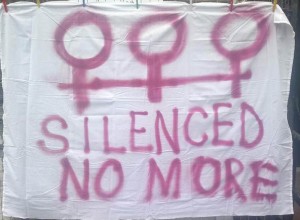Roxana Geru, București, Romania, SSH Blog Correspondent
 As a woman raised in Romania, I have been taught that I am not equal with a man. It is not necessarily my family who taught me, but my school, my friends, the church, and the SOCIETY. For a long time, I really believed it. I believed that I cannot do or I am not supposed to do some things, just because I am a woman. Like if a woman wears short pants she is considered a sexual worker, who “asks for it.” Or if a woman dares to drink a beer with a man she is an alcoholic. Or it a horrible thing to see a girl eating in McDonald’s.
As a woman raised in Romania, I have been taught that I am not equal with a man. It is not necessarily my family who taught me, but my school, my friends, the church, and the SOCIETY. For a long time, I really believed it. I believed that I cannot do or I am not supposed to do some things, just because I am a woman. Like if a woman wears short pants she is considered a sexual worker, who “asks for it.” Or if a woman dares to drink a beer with a man she is an alcoholic. Or it a horrible thing to see a girl eating in McDonald’s.
Instead, it is believed that all a woman is supposed to do is be pretty, cook and give birth.
During my teens I felt upset. I did not understood why it was forbidden for me to do some things that were not for my best friend, who was a guy. And I cried. But after a few years I accepted that people have different points of view. I started to see equality as a thing which involves rights and obligations as well. And to accept that men can naturally be more physical strong than women, but that does not mean that all guys have to be strong or all the girls have be less strong. That maybe we are not born equal, but we should all have an equal chance to get where we want.
A few months ago I was at a university helping students who wanted to join the Psychology Faculty. At the beginning, we had to explain to them that they had to pay a fee and then come back. Everything seemed to be okay until one guy came back in this public institution and started to yell at us that he did wrong because of us. This “us” refers to a group of six women and a guy. Some of us tried to calm him down and explain to him that he was wrong and he misunderstood. We even came to him with some solutions for his problem. When a woman, a friend of mine, tried to speak to him, he yelled at her, “I do not speak to you. You are a woman. You are a woman and you do not have statute.”
My friend and I did not have any idea how we should reply because he became very verbally aggressive toward us.
I was shocked to see a guy around my age say that women do not have any statute. That women are nothing but objects who have to be pretty and produce kids. I wonder how that guy acts at home with his mother, his sister, his girlfriend. How will he act with his daughter? What he will teach his daughter? How will he react when his daughter comes home and says that another guy punched her. Will he defend her? Or he will congratulate the other guy?
I know my story is not exactly about street harassment, but it shows what it is like to be a woman in Romanian society. It is about how some of us are educated. It is one of the reasons why women in Romania are street harassed. It can be an answer to the question of “Why, as a woman in Romania, can someone touch my back?” or “Why, as a woman, in Romania, do some guys whistle after me?” and “Why does no one do something when someone rapes a girl?”
We have to see our culture change if we want to see street harassment and other forms of sexual violence end.
Roxana is a 21-year-old who is studying psychology and plans to do a master’s program in Sexuality and Gender Studies. She hopes to one day work within the LGBT community, with sexual workers and/or with people who are suffering from sexuality disorders.
